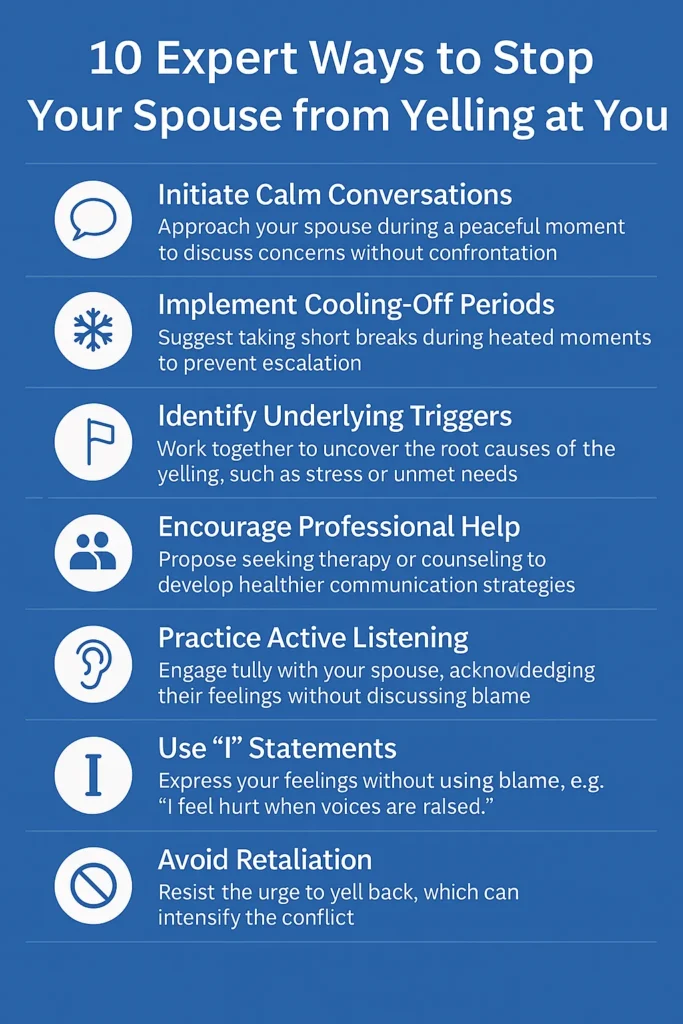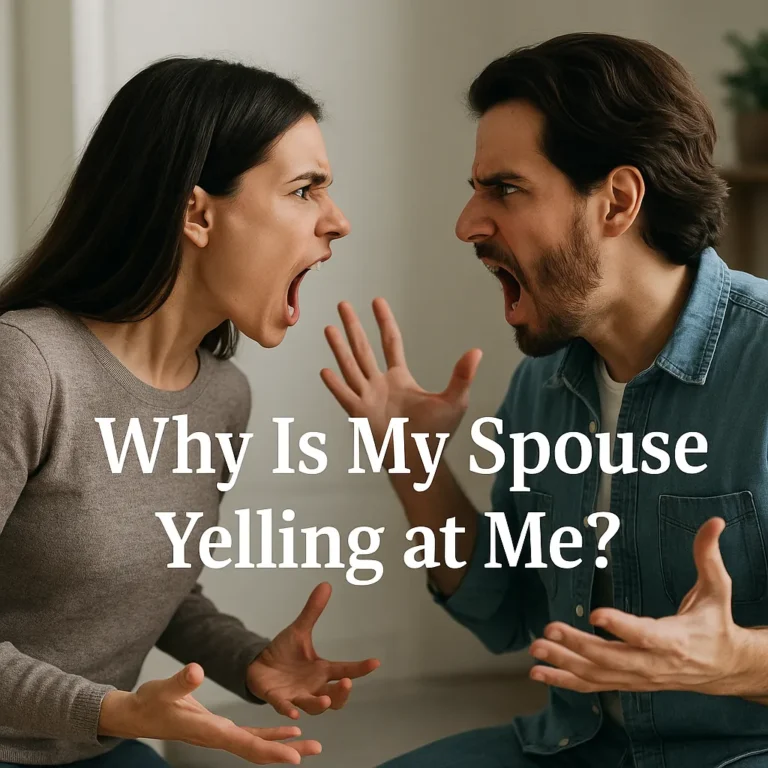It’s jarring when the person you love starts raising their voice — especially when you’re not sure why. If you’re asking yourself, “Why is my spouse yelling at me?” you’re not alone. Whether it’s your wife or your husband, the shouting often stems from deeper emotions that go unspoken.
In this blog, we’ll unpack the hidden reasons behind these emotional outbursts, from communication breakdowns to stress triggers and unmet expectations. Understanding the “why” is the first step toward healing and reconnecting. Stay with us — the insights ahead might just change the way you see your relationship.
🧩 Common Reasons Why Your Spouse Might Be Yelling
Yelling in a relationship often feels sudden, but it’s rarely without cause. If you’ve been asking yourself, “Why is my husband yelling at me?” or “Why is my wife yelling at me?” — the answer might lie beneath the surface of day-to-day frustrations.
One of the most common reasons for yelling is chronic miscommunication. When needs, feelings, or concerns are consistently ignored or misunderstood, emotions can build up until they erupt in raised voices. Sometimes, yelling becomes a desperate attempt to feel heard.
In many cases, your spouse may be responding to stress, burnout, or emotional overload — not necessarily to you as a person. If you’re wondering “Why does my wife yell at me?” or “Why is my husband always yelling at me?”, consider whether external pressures like work, finances, or parenting are contributing factors.
Yelling can also be a sign of unresolved resentment or emotional pain. Perhaps there are recurring issues that haven’t been addressed in a healthy way. When you hear yourself thinking, “Why is my wife always yelling at me?”, it’s worth reflecting on whether you both feel emotionally safe in the relationship.
Sometimes, yelling is a modeled behavior — learned from childhood or previous relationships. It becomes an unconscious communication style, even if it’s harmful. So, before labeling your spouse as “angry” or “mean,” pause to ask: what’s really driving their behavior?
🧠 The Psychology Behind Yelling in Relationships
Understanding why your spouse is yelling requires more than just focusing on the situation — it involves digging into the psychology of emotional expression. Yelling is often a learned behavior tied to how someone processes frustration, anger, or even fear.
When someone raises their voice, it activates the fight-or-flight response in both people. This isn’t just metaphorical — it’s biological. The body perceives yelling as a threat, releasing stress hormones like cortisol, which can erode emotional safety in a relationship over time. That’s why the psychological effects of being yelled at by a spouse often include anxiety, low self-esteem, and emotional withdrawal.
For many couples, yelling becomes a patterned way of coping — not just with each other, but with life itself. In cases where the effects of a husband yelling at his wife are long-lasting, it’s often because the wife no longer feels respected or emotionally secure. The same is true in reverse: husbands who are constantly yelled at may feel belittled or emasculated.
The deeper issue is that yelling doesn’t solve problems — it amplifies them. It trains the brain to associate your partner with stress, not comfort. Over time, the effects of yelling at a spouse can lead to resentment, emotional distancing, and even trauma-like symptoms.
Recognizing these psychological undercurrents is key to breaking the cycle. It’s not just about volume — it’s about emotional safety.
🗯️ My Spouse Is Always Yelling at Me — Real-Life Situations
| Trigger Behind Yelling | Possible Root Cause | Healthy Response |
|---|---|---|
| “You never listen to me!” | Feeling ignored or dismissed | Practice reflective listening, validate their words |
| “You always leave the mess for me!” | Built-up resentment or imbalance in effort | Acknowledge the load and share responsibilities |
| “You don’t care about this relationship!” | Emotional disconnection or unmet needs | Reassure, then ask, “What can I do better?” |
| Yelling in public | Poor emotional regulation, lack of boundaries | Discuss boundaries privately, not during conflict |
| Explosive reactions to small issues | Chronic stress or past unresolved trauma | Pause, validate feelings, offer to revisit calmly |
When you’re in the thick of a heated moment, it’s easy to feel isolated. But truthfully, countless couples face the same dynamic. Many have asked themselves, “Why does my wife yell at me over small things?” or “Why does my husband yell so much?” — and the answer is rarely simple.
Take, for example, the scenario where a wife raises her voice in public. If you’ve thought “My wife yells at me in public and it’s embarrassing,” it likely stems from unresolved tension that’s spilling over. This doesn’t mean she doesn’t care — it may mean she hasn’t found healthier ways to express frustration.
On the flip side, if your husband yells at you every time there’s a disagreement, it could be about more than just the immediate issue. Husband yelling at wife is often linked to feeling disrespected or unheard, even if that perception isn’t mutual. It can be a defense mechanism disguised as anger.
In some relationships, yelling isn’t tied to major conflicts at all. It’s become a default communication style. You might think “My wife always yells at me” or “My husband yells at me all the time,” and feel like you’re walking on eggshells, anticipating the next outburst.
What these real-life cases show is that yelling is often a symptom, not the root problem. Whether it’s your wife screaming at you over chores or your husband shouting during financial arguments, the volume is a sign that something deeper needs attention.
🧩 What to Do When Your Wife or Husband Yells at You
Yelling doesn’t always mean the relationship is doomed — but how you respond matters. Whether it’s your wife or your husband raising their voice, your reaction can either escalate or de-escalate the situation. Let’s break down practical ways to manage and respond to this behavior with clarity and calm.
🛑 1. Don’t Yell Back — Stay Calm and Grounded
Reacting with more yelling will only intensify the argument and shut down healthy communication. Emotional regulation is your power tool.
- Breathe deeply and count to ten before responding.
- Focus on what your spouse is saying, not how they’re saying it.
- Maintain neutral body language — don’t roll your eyes or clench fists.
- If needed, take a short walk or physical space to cool off.
Staying calm doesn’t mean you’re accepting mistreatment — it means you’re protecting your peace and avoiding emotional damage.
🗣️ 2. Use Assertive, Not Aggressive Communication
Yelling is often a cry to be heard — and being assertive helps break the yelling cycle without resorting to silence or aggression.
- Use “I” statements like “I feel hurt when…” instead of “You always yell!”
- Keep a steady tone, even when emotions are high.
- Validate their frustration without excusing the yelling.
- Reframe the conflict: “Can we talk when we’re both calmer?”
This approach builds respect and opens the door to healthier, two-way dialogue.
⏸️ 3. Know When to Pause the Conversation
Sometimes, the best reaction is stepping back. Constant yelling can push both partners into saying things they don’t mean.
- Say: “I want to talk, but not like this. Let’s take a break.”
- Avoid storming out — set a time to revisit the conversation.
- Use a neutral word or signal as a timeout cue during arguments.
- Let silence de-escalate instead of provoke.
Taking a pause gives both of you mental space to think clearly rather than emotionally.
🧭 4. Set Boundaries Around Verbal Abuse
There’s a difference between occasional yelling and emotionally abusive behavior. Know when a line is being crossed.
- Make it clear yelling isn’t acceptable, even when upset.
- If your spouse refuses to respect boundaries, consider therapy.
- Don’t excuse yelling that involves threats, name-calling, or control.
- In severe cases, seek support from domestic violence resources.
Healthy relationships require mutual respect, not fear or intimidation.
💬 5. Seek Professional Help if Patterns Persist
If the yelling feels constant, unpredictable, or emotionally damaging, it may be time for outside help.
- Look into couples counseling or individual therapy.
- Explore anger management programs if yelling is chronic.
- Don’t wait for a “breaking point” to ask for help.
- Normalize seeking support — strong couples ask for guidance.
Therapy provides a safe space to unpack root issues and rewire how you both handle conflict.
🚩 When Yelling Turns Toxic — Know the Warning Signs
Not all yelling is created equal. While occasional raised voices in moments of stress can happen in any relationship, chronic, aggressive, or demeaning yelling is a red flag — one that should not be ignored. If you’ve started to feel scared, emotionally drained, or even unsafe when your spouse yells at you, you may be experiencing verbal or emotional abuse.
Statements like “My wife yells at me over small things” or “My husband always yells at me” are not just passing complaints — they could be signs of deeper toxicity. If yelling includes insults, public humiliation, threats, or attempts to control, it’s not just a communication problem anymore — it’s emotional manipulation. When a spouse yells to dominate rather than express, it crosses into harmful territory.
Men and women alike can be victims of toxic yelling. “My wife screamed at me in front of our kids,” or “My husband shouts at me every time I disagree” aren’t just anecdotes — they can point to repeated patterns of psychological harm. And if you find yourself adjusting your behavior constantly just to avoid triggering another outburst, that’s a sign of walking on emotional eggshells — not love.
It’s also important to consider whether yelling is escalating over time. Has your spouse started yelling more frequently, louder, or more viciously? Do you feel emotionally paralyzed after every argument? These are signs that the conflict is no longer about the issue — it’s become a power struggle. And in some cases, yelling can be a precursor to more serious forms of abuse.
No one deserves to be verbally assaulted in their own home. Recognizing these warning signs early can protect your emotional well-being — and possibly your physical safety. If the yelling has become relentless, cruel, or intimidating, reaching out to a counselor, support group, or domestic violence hotline is not just advisable — it’s necessary.
| Yelling (Situational Conflict) | Verbal Abuse (Toxic Pattern) |
|---|---|
| Happens occasionally | Happens frequently and predictably |
| Expresses frustration | Intentionally controls or belittles |
| Followed by remorse and change | Followed by blame or manipulation |
| You feel emotionally safe overall | You feel fear, anxiety, or shame |
🧭 Rebuilding Communication After Constant Yelling
Even after countless shouting matches, healing is possible. But it requires intention, vulnerability, and a plan. Let’s break down how you can move forward — without staying stuck in the echo of raised voices.
🔄 Problem: “We can’t talk without yelling.”
Reason: You’ve both learned to equate volume with power — and silence with punishment.
Solution:
- Set up a “safe conversation window” each week with no phones or distractions.
- Use a talking stick or cue phrase (“I’m listening”) to take turns without interrupting.
🧱 Problem: “I don’t feel safe sharing my thoughts anymore.”
Reason: Emotional safety has eroded, likely due to past verbal attacks.
Solution:
- Create “no-yell” zones or rules: the bedroom, the dinner table, etc.
- Reinforce every calm conversation with appreciation (e.g., “Thanks for staying calm today”).
❌ Problem: “They apologize, but it keeps happening.”
Reason: There’s no accountability — just a cycle of guilt and repetition.
Solution:
- Introduce consequences or boundaries: “If the yelling starts again, I will leave the room.”
- Consider couples therapy to have a third-party witness and mediator.
🔍 Problem: “I don’t know how to say what I feel.”
Reason: Years of miscommunication have shut down your ability to express needs.
Solution:
- Practice journaling emotions first, then sharing key points with your spouse.
- Use prompts like: “When you yelled, I felt ___. I wish you would ___ instead.”
🧠 Problem: “Yelling is how we’ve always communicated.”
Reason: It’s a learned behavior — not a healthy one.
Solution:
- Watch videos, read books, or attend workshops on conscious communication together.
- Replace yelling with a neutral action — like setting a timer before discussing tough topics.
✅ The Goal:
Rebuilding communication after yelling isn’t about never arguing again — it’s about arguing with respect, boundaries, and love. Progress is made through small steps, not perfect silence.
📌 10 Expert Ways to Stop Your Spouse from Yelling at You
Struggling to calm the storm when arguments get loud? You’re not alone — and there are proven strategies that can help. This infographic highlights ten expert-backed methods to de-escalate yelling, set respectful boundaries, and encourage healthier communication with your spouse. Whether you’re navigating occasional outbursts or frequent shouting, these tips can guide you toward more peace, connection, and emotional safety in your relationship.

1. Initiate Calm Conversations
- Approach your spouse during a peaceful moment to discuss concerns without confrontation.
2. Implement Cooling-Off Periods
- Suggest taking short breaks during heated moments to prevent escalation.
3. Identify Underlying Triggers
- Work together to uncover the root causes of the yelling, such as stress or unmet needs.
4. Establish Clear Boundaries
- Set mutual agreements on acceptable communication methods during disagreements.
5. Encourage Professional Help
- Propose seeking therapy or counseling to develop healthier communication strategies.
6. Practice Active Listening
- Show empathy by attentively listening and validating your spouse’s feelings.
7. Use “I” Statements
- Express your feelings without assigning blame, e.g., “I feel hurt when voices are raised.”
8. Reinforce Positive Behavior
- Acknowledge and appreciate moments when your spouse communicates calmly.
9. Avoid Retaliation
- Resist the urge to yell back, which can intensify the conflict.
10. Prioritize Self-Care
- Engage in activities that reduce stress and promote emotional well-being.
💞 Conclusion: When Yelling Stops, Real Understanding Begins
By now, if you came here wondering “Why is my wife yelling at me?” or “Why is my husband yelling at me?” — you’ve likely uncovered more than just the surface-level reasons. Yelling is rarely about the volume; it’s about the pain, frustration, or unmet emotional needs living underneath. It can come from stress, fear, past wounds, or simply not knowing how else to be heard.
But here’s the good news: you’re no longer in the dark.
You now understand the psychology behind yelling, have seen how it shows up in real life, and more importantly — you’ve explored real, practical solutions to transform chaos into calm. Whether you’re the one being yelled at or the one raising your voice, this blog was written with love, empathy, and clarity for both of you.
Yelling doesn’t have to be your love language. It doesn’t have to be your story.
When couples begin to listen without fear, speak without shouting, and respond without rage — healing begins. So if your home has echoed with loud words, may it now echo with understanding. If your heart has felt bruised by yelling, may it now feel brave enough to rebuild.
Because behind every “Why is my spouse yelling at me?” is a relationship that still wants to be understood — and that, in itself, is the beginning of peace.






